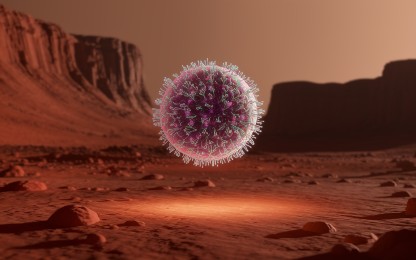Introduction
Scientists explore how microbial life could survive on Mars. The planet has harsh cold and dry conditions. Still certain microbes on Earth thrive in similar places. These extremophiles give hope that life can exist on Mars.
The idea that microbial life could survive on Mars drives many space missions. Space agencies use advanced tools to find proof. Their goal is to learn if Mars has ever supported life.
This article explains how microbial life could survive on Mars. We examine the science behind it and what this means for future exploration.
Martian Environment and Life’s Challenge
Mars Has a Thin Atmosphere
The Martian atmosphere lacks pressure and warmth. It has mostly carbon dioxide. This makes survival hard for most life.
Still microbial life could survive on Mars if it hides underground. Below the surface conditions stay more stable. Earth microbes live deep in rocks so this gives hope.
Rovers study Mars to find signs of life. They check soil and rocks. Microbial life could survive on Mars in hidden places away from harmful radiation.
Radiation on Mars Is Strong
Mars has no magnetic field to protect life from radiation. UV rays hit the surface without much filter.
Microbial life could survive on Mars by living beneath soil layers. That layer can block deadly rays. Earth microbes in Chernobyl and high altitudes handle radiation.
Scientists test if Mars soil can protect microbes. Some microbes have shown good survival after exposure to Mars-like rays. These studies help prove that microbial life could survive on Mars.
Water Clues Offer Hope
Water is key for life. Microbial life could survive on Mars if water exists in some form.
Mars has frozen water at its poles. Some areas show signs of past flowing water. Salt-rich regions may hold liquid water under the surface.
Earth microbes live in salty icy places. That suggests microbial life could survive on Mars if conditions match. Finding these wet spots is a main goal for Mars missions.
Earth’s Extremophiles Offer Insight
Microbes on Earth Survive Extreme Heat and Cold
Antarctica and deep sea vents host microbes that live in harsh places. They handle freezing or boiling conditions.
Microbial life could survive on Mars if it works like these Earth microbes. Some handle cold and little food. Others manage heat and high pressure.
NASA tests these microbes to see how they handle Mars-like labs. Their results help prove microbial life could survive on Mars over time.
Salt-Tolerant Microbes Are Good Models
Certain Earth microbes live in salty lakes. They survive high salt levels and dry air.
Microbial life could survive on Mars if salt helps water stay liquid. Salt lowers water’s freezing point. That can allow briny water to exist under Mars’ crust.
Salt-loving microbes adapt well. They fix DNA damage fast and stay active in harsh environments. These traits show how microbial life could survive on Mars today.
Microbes Use Rock for Shelter
Endoliths are microbes that live inside rocks. They get protection from heat cold and radiation.
Microbial life could survive on Mars if it lives in rocks. Rovers check rock layers for signs of life. Scientists look for bio-signatures and fossil-like patterns.
Mars rocks might hold life signs from billions of years ago. If not alive now microbes may still leave chemical clues behind.
Scientific Missions Searching for Life
Rovers Collect Soil and Rock Samples
NASA and other groups send robots to Mars. They search for signs of life using special tools.
Microbial life could survive on Mars today or may have lived in the past. Rovers like Perseverance study soil to find organic molecules.
In 2030 samples from Mars will return to Earth. These will help scientists confirm if microbial life could survive on Mars.
Orbiters Map Ice and Water Zones
Spacecraft above Mars map the surface. They search for ice and water-rich zones.
Microbial life could survive on Mars if water exists under the surface. Orbiters help guide rovers to promising spots.
Using radar scientists found signs of subsurface lakes. These spots offer the best chance for microbes to survive.
Future Missions Plan Human Research
Human missions may explore Mars soon. Astronauts will help test for life in real time.
Microbial life could survive on Mars in deep areas that robots cannot reach. Humans will drill deeper and examine more samples.
This will improve the search for microbes. Mars labs will study life in greater detail and in real time.
How Microbes Might Survive Mars Conditions
Dormancy Helps Microbes Last
Some microbes go dormant when stressed. They stop growing and use little energy.
Microbial life could survive on Mars by entering dormancy. This lets them wait for better conditions. When water appears they become active again.
Earth microbes stay dormant for thousands of years in ice or dry places. Mars microbes might do the same.
DNA Repair Boosts Survival
Radiation damages DNA. Microbes must fix that fast or they die.
Microbial life could survive on Mars if they repair DNA well. Some microbes have strong systems for fixing radiation damage.
These abilities mean life can recover after being hit by Mars radiation. They also prevent mutation buildup over time.
Biofilms Provide Group Protection
Biofilms are layers of microbes that protect each other. They hold moisture and resist damage.
Microbial life could survive on Mars by forming biofilms. These help them share resources and protect inner cells.
Earth microbes use biofilms in dry places like deserts. Mars microbes might use the same defense.
What Microbial Survival Means for Us
It Helps in the Search for Alien Life
If microbes live on Mars it means life is not rare. That changes how we see the universe.
Microbial life could survive on Mars and even evolve. This may point to life on other planets too.
It shows life finds a way. We must search carefully on Mars and beyond.
It Prepares Us for Colonizing Mars
Knowing if life exists on Mars is vital. We must avoid harming local life.
Microbial life could survive on Mars in places where humans may go. We need rules to protect both Martian and Earth life.
This helps build clean missions that support science and safety.
It Improves Tech for Harsh Places
Studying Martian life helps create tools for harsh places. That helps Earth too.
Microbial life could survive on Mars with aid from new tech. These systems can support microbes in space and on Earth.
Better tech means better farming in deserts and clean water systems.
Pros and Cons of Microbial Life on Mars
| Pros | Cons |
|---|---|
| Shows life may exist beyond Earth | Mars has deadly radiation |
| Builds knowledge for future Mars missions | Hard to confirm life from remote tools |
| Microbes could help build Mars ecosystems | Contamination risk from Earth microbes |
| Helps plan for human survival on Mars | Life may be deep and hard to reach |
| Offers clues for searching life on exoplanets | Proving current life exists takes many years |
Frequently Asked Questions
Can microbes live on Mars now?
Yes microbial life could survive on Mars underground. Conditions there are more stable and may hold water.
What protects microbes on Mars?
Soil and rocks protect them from UV rays. Some microbes also use biofilms and strong DNA repair systems.
How do microbes get water on Mars?
They may use briny water under the surface. Salts can keep water liquid in freezing cold.
Are Earth microbes similar to Mars ones?
Earth extremophiles show how microbial life could survive on Mars. They handle heat cold salt and radiation.
How do scientists test Mars survival?
They expose microbes to Mars-like labs. They also study rock samples and run Mars rover tests.
Conclusion
Microbial life could survive on Mars by using extreme survival methods. These include dormancy salt use and rock shelter.
Earth microbes show that life adapts in ways we never thought. Mars may hold similar forms that wait in the cold dark soil.
Future missions will dig deeper and bring samples home. We may find proof that microbial life could survive on Mars even now.
The search continues with each rover and test. The idea that Mars could hold life remains strong. Science keeps pushing forward with hope.





